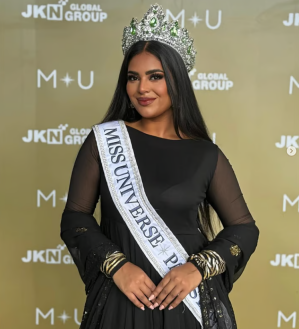
Roma Riaz is used to being the “first,” but not to the kind of attention she received in the weeks leading up to the recent Miss Universe pageant held on Nov. 21. As the first Pakistani Christian to compete in the contest, the 27-year-old found herself at the center of an intense online debate.
What should have been a moment of national pride instead ignited arguments about beauty, representation and identity, with trolls targeting her skin tone, body type, and even her faith. Riaz, however, made it clear she would not stay silent.
Born to a Punjabi Christian family and raised in the United Kingdom, Riaz’s selection as Miss Universe Pakistan 2025 generated mixed reactions both at home and abroad. Her appointment challenged long-standing beauty ideals in South Asia, where fair skin and specific body proportions have historically been treated as markers of desirability.
Critics, often hiding behind anonymous accounts, accused her of being “too dark,” “too curvy,” or “not representative of Pakistani beauty,” while others questioned whether someone raised overseas could embody the nation on such a global stage.
Riaz met the backlash head-on. In statements and a widely shared Instagram reel, she said the comments were not merely personal attacks but reflections of deeper societal prejudices.
“I will not apologize for looking like my people,” she said, stressing that the criticism often stems from the toxic belief that fairness equals beauty. Colorism, she reminded her critics, teaches people “to celebrate fairness and forget where they came from.”
“I am Pakistani in my roots, in my values, and in every shade of my skin,” she said. “My skin is the same color as the women who built our homes, our families, and carried our nation in their hearts.”
She added that she proudly represents not just Pakistan but “a new generation of South Asian women who don’t fit into the narrow boxes of what society thinks we should look like.”
Switching to Urdu in her message to Pakistanis, Riaz questioned why some people were so quick to belittle their own countrywomen. She said she constantly tells the world how beautiful Pakistan’s people are, only to be asked why those same people spread so much negativity about her.
Riaz urged critics not to sabotage the image she is trying to build. “Everyone is entitled to their opinion, but if you don’t have anything nice to say, please, for the sake of Pakistan’s reputation, don’t say anything.”
In a direct message to young girls, she added: “Any girl who has been labelled ‘too dark, too different or too bold’ represents Pakistan just as much as anyone else.”
“This pageant was more than just becoming Miss Universe Pakistan,” she said. “It’s an answer to everyone who has ever questioned my identity.” She emphasized that beauty cannot be confined to a single mold and that Pakistan’s diversity — in culture, complexion and heritage — deserves to be seen and celebrated.
Her response has resonated widely, especially with South Asian women who rarely see their own features represented without hesitation or apology.
For many observers, the online criticism has highlighted Pakistan’s longstanding struggle with colorism — a social issue shaped by class structures and colonial history. From marriage proposals to job prospects, skin tone has often been used as a measure of worth.
Riaz’s refusal to conform has rekindled conversations about how deeply this bias runs and how destructive it can be for young people growing up under its shadow.
Riaz has also used her platform to advocate for girls’ education, calling it “the greatest form of empowerment.” She hopes her visibility can encourage young Pakistani women — especially those labelled “too dark,” “too different,” or “too bold” — to embrace their identities rather than shrink themselves to fit societal expectations.
Riaz’s stance extends beyond appearance. After wearing a sari at one Miss Universe event, she pushed back against critics who questioned whether it was “Pakistani enough,” asserting that the garment is just as much a part of the region’s cultural heritage as the Shalwar Kameez.
As she stood on the global stage in Thailand, Riaz’s message was clear: Pakistan is not defined by one skin tone, one culture or one body type. And no woman representing her country should be torn down for looking like the people she comes from.





